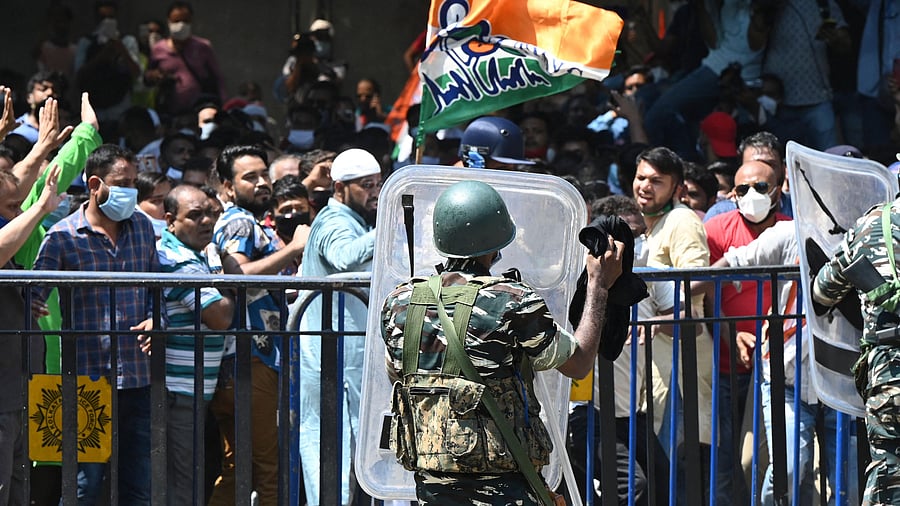
Priorities change, sometimes fast and sometimes slowly. In politics, priorities shift as a reaction and a response to events that overtake earlier concerns. And events have rushed past the Bharatiya Janata Party (BJP)’s political agenda in West Bengal, leaving it looking increasingly more irrelevant, at least for now.
The inflexibilities of a rigid hierarchy with control vested outside West Bengal shaped the election campaign and affected the outcome. If the BJP was tone-deaf in the campaign for the 2021 state Assembly elections in West Bengal, further proof of that is its current preoccupations with political violence and with the Central Bureau of Investigation (CBI)’s interminable wrangling over house arrest or bail, that has progressed from the High Court to the Supreme Court over a week, of four politicians.
The four politicians arrested include two ministers from the Trinamool Congress, Firhad Hakim and Subrata Mukherjee, one legislator from the same party, Madan Mitra, and one spent leader without a party, Sovan Chatterjee, in the Narada case, a sting operation that recorded on video bribes being given and taken by not just these politicians but ten others.
The prolonged legal battle over the modalities of incarceration of the two ministers has been already judged on social media as “revenge politics” by the BJP using the power it has to nudge the CBI into insisting that they remain locked up. In the public perception, ministers Hakim and Mukherjee have been stopped by the Narendra Modi-Amit Shah regime from dealing with the Covid surge and now the cyclone. Confirming the popular view that the BJP is intent on destabilising the Mamata Banerjee government, both the Congress and the Communist Party of India (Marxist) have condemned the arrests as “politically motivated” and a move to divert attention from the Centre’s “mismanagement” of the second surge of the pandemic.
Illustrative of the disconnect between the BJP’s politics and the priorities of the people is the dramatic demands by a defeated candidate, Locket Chatterjee, for withdrawal of central security detail because she cannot protect her “workers” from the ongoing violence by the Trinamool Congress. The BJP’s persistence in shooting spent arrows from its limited quiver reveals why it got it all wrong in the elections.
If the BJP was politically savvy in West Bengal, it would have focused on the cyclone, exerting the pressure it possesses as the only Opposition party in the state assembly to hound Mamata Banerjee on her handling of the impending disaster. The BJP made the siphoning of relief material and rehabilitation funds an election issue, even though it did not yield the wins it expected.
She, on the contrary, is perfectly aware of the imperative to erase the mistakes of the past and create a new record of corruption-free and effective governance, in the context of a super cyclone, because her political antenna is tuned to pick up signals that could sink her whenever the overdue municipal and panchayat elections are held.
During the campaign and eight-phase polling, the BJP was singularly oblivious of the pandemic, its nature and its deadly effects as the larger context in which the elections were being held. For the party, the Trinamool Congress’s alleged sponsorship of violence against the BJP, which began before the elections and continues post the results, has been the most urgent issue.
The party’s call for President’s Rule even as the ballots were being counted, its glee when Governor J P Dhankar unleashed a Twitter attack on the lawlessness in the state that indicated a near breakdown of constitutional machinery, his visits to the districts where BJP workers were attacked, the prime minister’s intervention and the visit of a high-powered central team, suggest that the BJP is even more clueless now.
The primary concerns of the public are not unearthing dirt on an old bribery and corruption case, nor is it political violence by the Trinamool Congress against the BJP. People are concerned about scarce resources – hospital beds, doctors, oxygen, ventilators, medicines and vaccines – to cope with the enormity of the second surge. And as of last Friday, there is panic that the cyclone could devastate an already crippled economy.
The BJP’s current tactics in West Bengal are a classic case of how not to be grounded in reality and to have no sense of either time or place. The price of living in a different reality is the plunging credibility of the party and its leadership. For the voter in West Bengal, the BJP’s leadership is not the local boss of the party; it is Modi. The command-and-control structure of the BJP allows for no alternative.
The inability to get over the bad and to remain stuck in the past, however recent it may be, is politically suicidal. It has wrecked the CPI(M)’s efforts at retrieving political ground in West Bengal. In contrast, Mamata Banerjee is remarkably nimble, adroitly skipping over the failures of her leadership by apologising to aggrieved voters on the one hand and promising to do better in the future.
As the official opposition, the BJP could do itself some good if it tracked her performance and grounded itself in local realities, instead of following a playbook that is useless in the culturally complex and very different political landscape in West Bengal.
(Shikha Mukerjee is a Kolkata-based senior journalist.)
Disclaimer: The views expressed above are the author’s own. They do not necessarily reflect the views of DH.